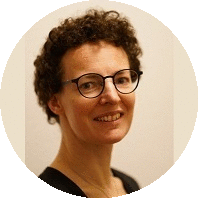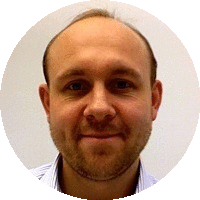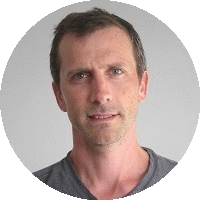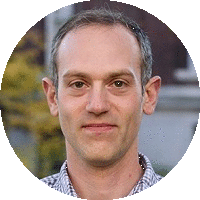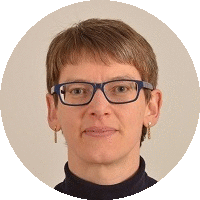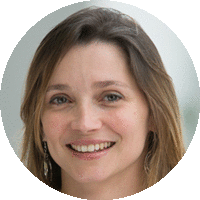Tuesday 18.6
Room: Amphithéâtre Jean-Baptiste Say
08:45 - 09:00 Welcome & Introduction (Jérémie Leguay)
Chair: Jérémie Leguay (Huawei)
09:00 - 09:45 Cristel Pelsser, Professor at the University of Strasbourg, France - Presentation
Detecting Network Outages using Different Sources of Data
The Internet is a complex ecosystem composed of thousands of Autonomous Systems (ASs) operated by independent organizations; each AS having a very limited view outside its own network. This impedes network operators to finely pinpoint the causes of service degradation or disruption when the problem lies outside of their network.
In this talk we will present different methods to detect remote network outages. Each technique is tailored to a different source of data, with its own properties and coverage. We will contrast these and provide light on the evaluation of outage detection approaches in the face of mostly absent ground truth.
Bio: Cristel Pelsser is a professor at the University of Strasbourg since November 2015. She leads team of researchers focusing on core Internet technologies. Her aim is to facilitate network operations, avoid network disruptions and, when they occur, pinpoint the failure precisely in order to quickly fix the issue. Cristel obtained her PhD from the UcL in Belgium and spent 9 years working for ISPs.
09:45 - 10:30 Steve Uhlig, Professor at Queen Mary University of London, UK - Presentation
Looking for Hypergiants in PeeringDB
Hypergiants, such as Google or Netflix, are important organisations in the Internet ecosystem, due to their sheer impact in terms of traffic volume exchanged. However, beyond naming specific instances, the research community still lacks a sufficiently crisp understanding of them. In this paper we analyse PeeringDB data and identify features that differentiate hypergiants from the other organisations. To this end, we first characterise the organisations present in PeeringDB, allowing us to identify discriminating properties of these organisations. We then use these properties to separate the data in two clusters, differentiating hypergiants from other organisations. We conclude this paper by investigating how hypergiants and other organisations exploit the IXP ecosystem to reach the global IPv4 space.
Bio: Prof. Uhlig obtained a Ph.D. degree in Applied Sciences from the University of Louvain, Belgium, in 2004. From 2004 to 2006, he was a Postdoctoral Fellow of the Belgian National Fund for Scientific Research (F.N.R.S.). His thesis won the annual IBM Belgium/F.N.R.S. Computer Science Prize 2005. Between 2004 and 2006, he was a visiting scientist at Intel Research Cambridge, UK, and at the Applied Mathematics Department of University of Adelaide, Australia. Between 2006 and 2008, he was with Delft University of Technology, the Netherlands. Prior to joining Queen Mary, he was a Senior Research Scientist with Technische Universität Berlin/Deutsche Telekom Laboratories, Berlin, Germany. Since January 2012, he is the Professor of Networks and head of the Networks research group at Queen Mary, University of London. He was a guest professor at the Institute of Computing Technology, Chinese Academy of Sciences, Beijing, China, between 2012 and 2016. Prof. Uhlig was the general chair of PAM 2017, ACM SIGCOMM 2015 and IMC 2017, as well as TPC chair of PAM 2017, IFIP Networking 2019, Global Internet 2019, and ICNP 2019. He is also area editor for IEEE Transactions on Networking as well as Elsevier Computer Communications. He published over 100 papers in international journals and conferences. His current research interests include Software-Defined Networking (SDN), Internet measurements (active and passive), as well as content delivery.
10:30 - 11:00 Coffee Break
Chair: Marco Fiore (CNR)
11:00 - 11:45 Mark Crovella, Professor at Boston University, USA - Presentation
Human Behavior is Low Dimensional
Every person is unique and complex. But can we predict anything about how large groups of people will behave? In the 1950s the writer Isaac Asimov imagined a field called “Psychohistory” that could mathematically describe the actions of large groups. I will argue that in a certain way, aspects of that vision are in wide use today. To illustrate, I will describe examples from my own work in which the “low dimensionality” of aggregate human behavior gives us leverage on a range of problems, from predicting network traffic to detecting anomalous or malicious behavior in social networks.
Bio: Mark Crovella is a Professor in the Department of Computer Science at Boston University, where he has been since 1994. From 2013 to 2018 he served as Department Chair. From 2012 to 2014 he served as Chief Scientist of Guavus, Inc. During 2003-2004 and again in 2018-2019 he was a visiting researcher at the Laboratoire d'Infomatique de Paris VI (LIP6), as well as INRIA Paris and LINCS (in 2018-2019).
His research interests span both computer networking and network science. Much of his work has been on improving the understanding, design, and performance of parallel and networked computer systems, mainly through the application of data mining, statistics, and performance evaluation. As of 2017, Google Scholar reports over 25,000 citations to his work.
Professor Crovella is co-author of Internet Measurement: Infrastructure, Traffic, and Applications (Wiley Press, 2006) and is the author of over two hundred papers on networking and computer systems. Between 2007 and 2009 he was Chair of ACM SIGCOMM. His papers have won the 2010 ACM SIGMETRICS Test of Time Award and the 2013 IETF/IRTF Applied Networking Research Prize. Professor Crovella is a Fellow of the ACM and the IEEE.
12:30 - 14:00 Lunch
Chair: Isabelle Chrisment (Loria)
14:00 - 14:45 Francis Bach, researcher at INRIA and adjunct Professor at Ecole Normale Supérieure - Presentation
Distributed Machine Learning over Networks
In this talk, I will expose about recent work on distributed algorithms for supervised learning, where the data are stored and processed on distinct nodes on a network. The resulting algorithms combine features from classical machine learning and classical network averaging techniques.
Bio: Francis Bach is a researcher at INRIA, leading since 2011 the SIERRA project-team, which is part of the Computer Science Department at Ecole Normale Supérieure, and a joint team between CNRS, ENS and INRIA. Since 2016, he is an adjunct Professor at Ecole Normale Supérieure. He completed his Ph.D. in Computer Science at U.C. Berkeley, working with Professor Michael Jordan, and spent two years in the Mathematical Morphology group at Ecole des Mines de Paris, he then joined the WILLOW project-team at INRIA/Ecole Normale Superieure/CNRS from 2007 to 2010. He obtained in 2009 a Starting Grant and in 2016 a Consolidator Grant from the European Research Council, and received the Inria young researcher prize in 2012, the ICML test-of-time award in 2014, as well as the Lagrange prize in continuous optimization in 2018. In 2015, he was program co-chair of the International Conference in Machine learning (ICML), and general chair in 2018; he is now co-editor-in-chief of the Journal of Machine Learning Research. Francis Bach is primarily interested in machine learning, and especially in graphical models, sparse methods, kernel-based learning, large-scale convex optimization, computer vision and signal processing.
ReCon: Revealing and Controlling Privacy Leaks from Mobile Devices
Mobile and IoT systems have become increasingly popular thanks in part to their rich sensors and continuous Internet access; however, recent studies demonstrate that software running on these systems extensively tracks and leaks users' personally identifiable information (PII). I argue that these privacy leaks persist in large part because users of these devices have little visibility into PII leaked through the network traffic generated by their devices, and have poor control over how, when and where that traffic is sent and handled by third parties.
In this talk, I describe ReCon, a cross-platform system that reveals PII leaks and gives users control over them without requiring any special privileges or custom OSes. Specifically, our key observation is that PII leaks must occur over the network, so we implement our system in the network using a software middlebox that can run on a home router, on a mobile device, in an enterprise network, or in the cloud. We use a machine learning approach to to efficiently and accurately detect users' PII without knowing a priori the content that is PII. Further, we develop techniques to block, obfuscate, or ignore the PII leak, by displaying leaks via a visualization tool and letting the user decide how the system should act on transmitted PII. I discuss the design and implementation of the system and evaluate its methodology with measurements from controlled experiments and flows from a user study with more than 300 volunteer participants worldwide.
Last, I discuss how we are applying these ideas to the IoT environment in our custom-built Mon(IoT)rLab, which is a space configured as a studio apartment packed with IoT devices one would expect to see in a "smart" home. IoT devices present numerous challenges beyond those in the mobile space, and I describe how we are adapting our methodology to better understand and control IoT privacy and security vulnerabilities.
To see Harvest, a short documentary film using ReCon, visit this link: https://vimeo.com/189449163
Bio: David Choffnes is a professor of Computer Science in the Khoury College at Northeastern University, and a member of the Cybersecurity and Privacy Institute. His research is primarily in the areas of distributed systems and networking, with a recent focus on privacy, security, transparency, and mobile systems. He earned a BA in Physics and French from Amherst College, a PhD from Northwestern, and completed a postdoc at the University of Washington prior to joining Northeastern. He is an NSF CAREER award winner, and his research has been supported by the National Science Foundation, Google, the Data Transparency Lab, Comcast, M-Lab, Arcep, Verizon, and a Computing Innovations Fellowship.
15:30 - 16:00 Coffee Break
Chair: Pedro Casas (AIT)
16:00 - 16:45 Sandra Scott-Hayward, Assistant Professor at Queen’s University Belfast (QUB), UK.
The 5 Ws of Network Monitoring for SDN-based IDPS
With the introduction of software-defined networks (SDNs) and network functions virtualization (NFV) come opportunities for efficient network threat detection and protection. SDN’s global view and NFV service distribution provide a means of monitoring and defence across the entire network. However, with distributed attacks involving high traffic volumes, network monitoring is a challenging task. In this talk, we will discuss our lessons learned and recommendations for efficient and proportionate network monitoring; the Who, What, When, Where, and Why (5 Ws) of network monitoring for SDN-based intrusion detection and prevention systems.
Bio: Dr. Sandra Scott-Hayward, CEng CISSP CEH, is a Lecturer (Assistant Professor) at Queen’s University Belfast (QUB). She has experience in both research and industry, having worked as a Systems Engineer and Engineering Group Leader with Airbus before returning to complete her Ph.D. at QUB. In the Centre for Secure Information Technologies at QUB, Sandra leads research and development of network security architectures and security functions for software-defined networks (SDN) and network functions virtualization (NFV). She has presented her research globally, has published a series of IEEE papers on performance and security designs for SDN/NFV, and has received a number of awards for her work. Sandra was elected Vice-Chair of the Open Networking Foundation (ONF) Security Working Group and served as vice-chair from 2015 to 2017. She received Outstanding Technical Contributor and Outstanding Leadership awards from the ONF in 2015 and 2016, respectively.
16:45 - 17:30 Aline Viana, permanent INRIA Research Scientist - Presentation
When Completion Challenges Current Human Mobility Understanding
Mobile phone data are a popular source of positioning information in many recent studies that have largely improved our understanding of human mobility. These data consist of time-stamped and georeferenced communication events recorded by network operators, on a per-subscriber basis. They allow for unprecedented tracking of populations of millions of individuals over long periods that span months. Nevertheless, due to the uneven processes that govern mobile communications, the sampling of user locations provided by mobile phone data tends to be sparse and irregular in time, leading to substantial gaps in the resulting trajectory information. In this talk, I will first illustrate the severity of the problem through an empirical study of a large-scale Call Detail Records (CDR) dataset. Then, I will present the Context-enhanced Trajectory Reconstruction, a new technique that hinges on tensor factorization as a core method to complete individual CDR-based trajectories. The proposed solution infers missing locations with a median displacement within two network cells from the actual position of the user, on an hourly basis and even when as little as 1% of her original mobility is known. This approach lets us revisit seminal works in the light of complete mobility data, unveiling potential biases that incomplete trajectories obtained from legacy CDR induce on key results about human mobility laws, trajectory uniqueness, and movement predictability.
Bio: Aline Carneiro Viana is a permanent INRIA Research Scientist. She got the Habilitation à Diriger la Recherche (HDR) at the Université Pierre et Marie Curie (UPMC – Sorbonne Universités), in December 2011. From November 2009 to October 2010, she spent one year working as an Invited Researcher at the Telecommunication Networks Group of the TU-Berlin. Before joining the INRIA in October 2006, she worked as a Post-Doc in the PARIS research team at IRISA/INRIA Rennes - Bretagne Atlantique. She spent three years and a half at the LIP6 laboratory of the Université Pierre et Marie Curie (UPMC – Sorbonne Universités), France, from where she got her Ph.D. Degree in July 2005. She received the B.Sc. in Computer Science (1998) and the M.Sc. Degree in Electrical Engineering (2001) from the Federal University of Goiás (UFG), Brazil. She did the M.Sc. research year at the Computer Network Research Group in the Polytechnic School of the Federal University of Rio de Janeiro (UFRJ), Brazil, (GTA/COPPE/UFRJ). Before integrating the M.Sc. courses, she was a start-up owner and worked as networking consultant at the start-up.

